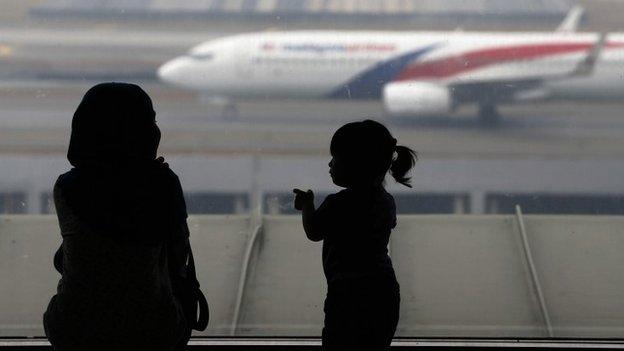MH370 relatives fight waning interest and legal battles
- Published
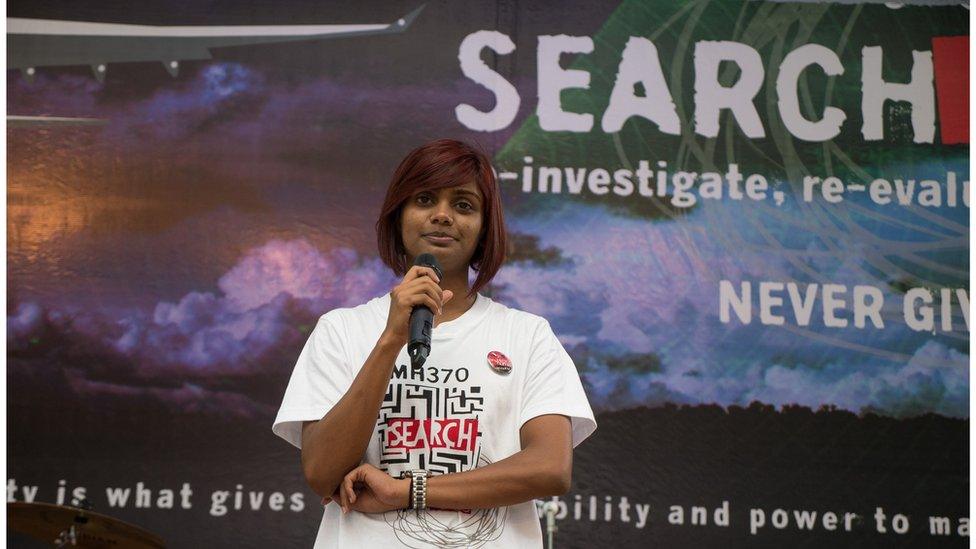
Grace Nathan, whose mother was on board, told the BBC the thought MH370 might never be found is harrowing for relatives
The memorial the families of those on board flight MH370 organised in Kuala Lumpur for the second anniversary of the plane's disappearance was held in the same place as the first: an open square, with a concert stage, built in the middle of one of the dozens of featureless shopping malls which act as public spaces in so much of South East Asia.
They held it two days before the anniversary, on a Sunday, in the hope that it would attract more people.
But the crowds were thin, and it was only the enthusiastic participation of T-shirt sellers, face-painters and assorted performers that really kept the event alive. And of course the extraordinary, decent forbearance of the NOKs, as they call themselves, the next-of-kin, as they once again recounted memories of lost loved ones, quite literally lost somewhere in the southern Indian Ocean.
But you could not escape the weariness in their voices as they appealed not to be forgotten. Another year has passed, and, notwithstanding the discovery of a barnacle-encrusted flaperon last year, which more or less confirmed that MH370 did indeed end up in the Indian Ocean, the NOKs know nothing else about the fate of the passengers.
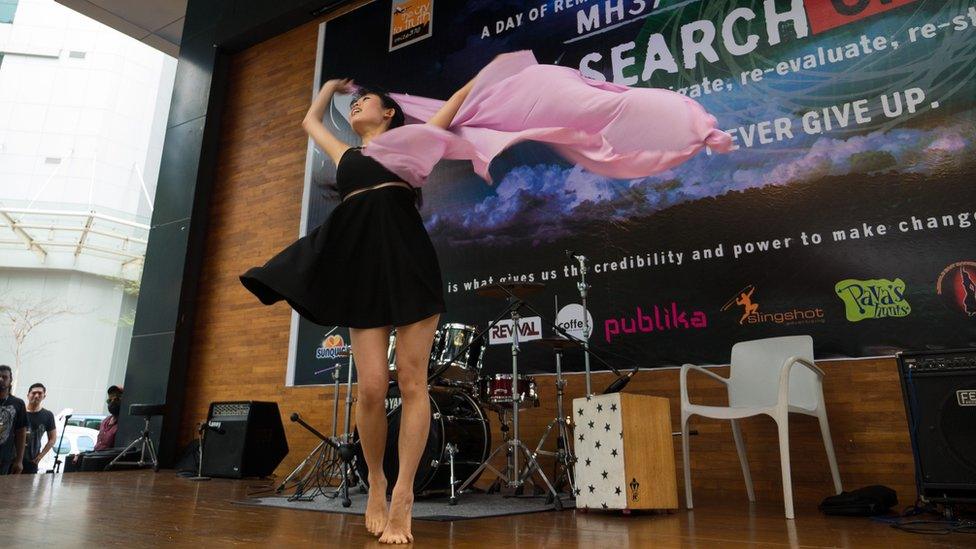
Despite scheduling it on Sunday, the event drew a relatively small audience
One clear theme of this year's memorial was for the search to go on, even after the current 120,000 sq km zone has been fully surveyed, probably by the end of June. At the moment there are no plans to continue the operation being run out of western Australia by the Dutch company Fugro, using state-of-the-art deep-sea sonar vehicles.
The zone was chosen in 2014 based on modelling from the seven "handshakes" MH370 made automatically with a satellite every hour - the only contact with the plane after all other communications were shut down. It was based on the assumption that the Boeing 777 ran out of fuel, and plunged into the sea. One alternative interpretation is that the pilot managed to glide the plane down gradually into the sea, taking it much further. But that would expand the search zone to three times the size of the existing one, which has already taken almost two years to survey.
The families, though, believe that should not stop them from trying.
"I definitely don't want the search to end", says Grace Nathan, whose mother Anne Daisy was on the flight. "It's a very harrowing thought for me and the next-of-kin.
"I understand from a logical standpoint what they are saying, that the funds are dwindling, that they've looked very thoroughly in this space, but for me it is very important to find the plane - not just for our own emotional reasons and our need for closure, but I believe the flying public also needs to know what happened."
MH370 relatives prepare for long fights
This month, the families have had to deal with a more immediate task - meeting the deadline imposed by international aviation regulations to file lawsuits against Malaysia Airlines and other parties. Those who have not filed suits by the two-year anniversary lose the right to do so, and must accept whatever compensation the airline offers.
This has been another emotional ordeal for them, says lawyer Arunan Selvaraj, who is representing 15 families.
"The whole thing is very traumatic. They are not sure whether they should have a funeral, whether they should move on. And now, because of the limitation period, everyone is under pressure to file their suits. But they find it very difficult to accept that they are claiming money when they don't even have answers to whether the person is alive or dead."
There has been a flurry of lawsuits filed in the past few days at the High Court in Kuala Lumpur, not just against the airline, but also against the government, the Malaysian aviation authority and the air force. Anyone, in fact, who might have played a role in allowing MH370 to vanish.
It is hard to keep track of all the lawsuits, as some are filed on behalf of several relatives of a single passenger. The administrator in charge of the airline's old parent company, Malaysia Airline Systems, who left after it was restructured, says a total of 119 suits filed in Malaysia have been approved. Some may since have been dropped as plaintiffs accepted out-of-court settlements.
Relatives have also filed lawsuits in Australia, the US and China. There are some complex variables in all these cases.
Grace Nathan, whose mother was on board MH370, says she and other relatives desperately want the search to go on until it is found
The 1999 Montreal Convention, which governs liabilities for international aviation, requires an airline to pay out around $160,000 per passenger after a fatal accident regardless of fault. It also places the burden of proof on the airline, which must show in court it was not negligent. In the absence of any evidence of what happened to flight MH370, lawyers say it is all but certain that Malaysia Airlines will be found liable.
But the Montreal Convention restricts claimants to filing lawsuits either in the country they are resident, the home country of the airline, or the final destination on their ticket. So very few are eligible to file in this case in the USA, where awards of damages are likely to be much higher than in Malaysia or China.
The claimants can file in the US against the aircraft manufacturer, Boeing, and some have tried to do that. But unlike the airline, here the burden of proof lies with the plaintiffs. Again, without any evidence, proving the plane was at fault is next to impossible.
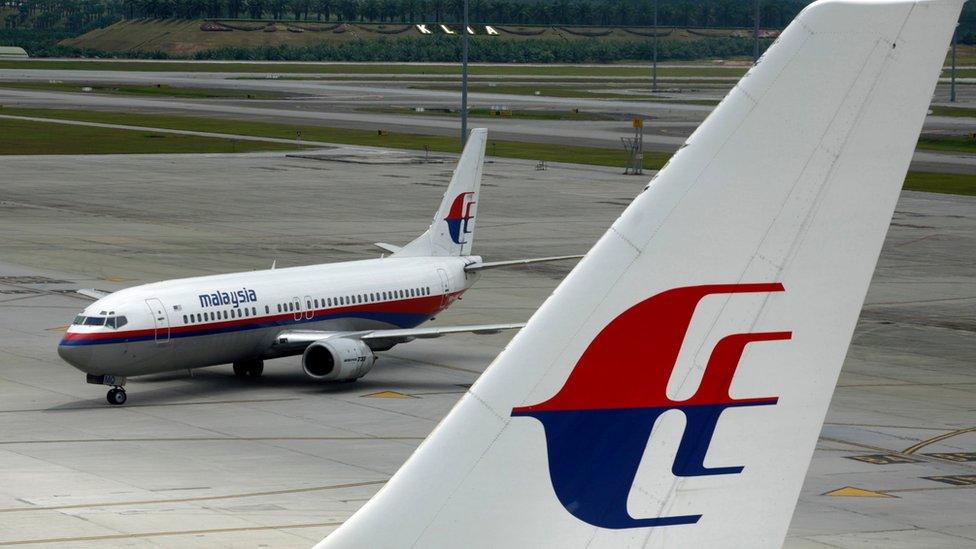
Malaysia Airlines is bracing for what could be bitter compensation battles
There are other uncertainties. The newly restructured Malaysia Airlines insists it has no liability for compensation. And a law passed after the company was renamed last year places limits on claims related to MH370, against it or the old parent company.
The airline has repeatedly promised it can and will meet all its legal obligations, but this may be restricted to what its insurance policy covers. After two years of often poor and insensitive communication, there is a widely-felt lack of confidence in how the Malaysian authorities have been dealing with the next-of-kin.
"Sadly the authorities have completely lost the trust of not just the families, but the public at large," says KS Narendran, whose wife Chandrika was on board flight MH370.
"I don't know if they have done enough to restore a modicum of trust."
- Published29 January 2015
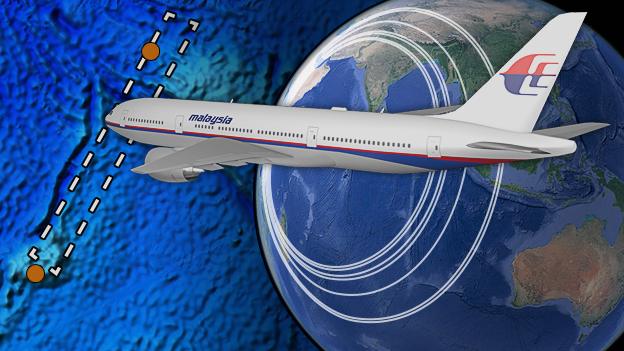
- Published17 January 2017
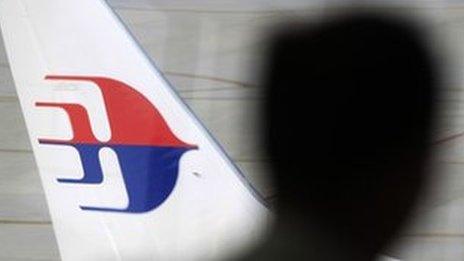
- Published17 March 2014
